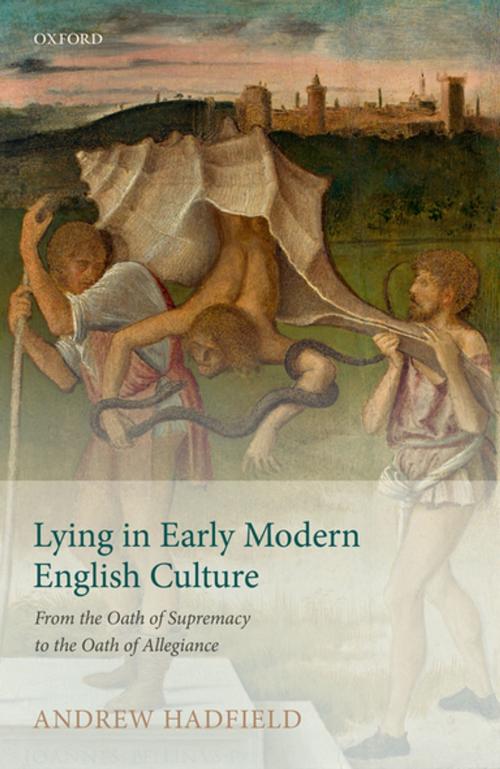Lying in Early Modern English Culture
From the Oath of Supremacy to the Oath of Allegiance
Nonfiction, Entertainment, Drama, Anthologies, Fiction & Literature, Literary Theory & Criticism, History| Author: | Andrew Hadfield | ISBN: | 9780192506597 |
| Publisher: | OUP Oxford | Publication: | September 7, 2017 |
| Imprint: | OUP Oxford | Language: | English |
| Author: | Andrew Hadfield |
| ISBN: | 9780192506597 |
| Publisher: | OUP Oxford |
| Publication: | September 7, 2017 |
| Imprint: | OUP Oxford |
| Language: | English |
Lying in Early Modern English Culture is a major study of ideas of truth and falsehood in early modern England from the advent of the Reformation to the aftermath of the failed Gunpowder Plot. The period is characterised by panic and chaos when few had any idea how religious, cultural, and social life would develop after the traumatic division of Christendom. While many saw the need for a secular power to define the truth others declared that their allegiances belonged elsewhere. Accordingly there was a constant battle between competing authorities for the right to declare what was the truth and so label opponents as liars. Issues of truth and lying were, therefore, a constant feature of everyday life and determined ideas of individual identity, politics, speech, sex, marriage, and social behaviour, as well as philosophy and religion. This book is a cultural history of truth and lying from the 1530s to the 1610s, showing how lying needs to be understood in action as well as in theory. Unlike most histories of lying, it concentrates on a series of particular events reading them in terms of academic theories and more popular notions of lying. The book covers a wide range of material such as the trials of Ann Boleyn and Thomas More, the divorce of Frances Howard, and the murder of Anthony James by Annis and George Dell; works of literature such as Othello, The Faerie Queene, A Mirror for Magistrates, and The Unfortunate Traveller; works of popular culture such as the herring pamphlet of 1597; and major writings by Castiglione, Montaigne, Erasmus, Luther, and Tyndale.
Lying in Early Modern English Culture is a major study of ideas of truth and falsehood in early modern England from the advent of the Reformation to the aftermath of the failed Gunpowder Plot. The period is characterised by panic and chaos when few had any idea how religious, cultural, and social life would develop after the traumatic division of Christendom. While many saw the need for a secular power to define the truth others declared that their allegiances belonged elsewhere. Accordingly there was a constant battle between competing authorities for the right to declare what was the truth and so label opponents as liars. Issues of truth and lying were, therefore, a constant feature of everyday life and determined ideas of individual identity, politics, speech, sex, marriage, and social behaviour, as well as philosophy and religion. This book is a cultural history of truth and lying from the 1530s to the 1610s, showing how lying needs to be understood in action as well as in theory. Unlike most histories of lying, it concentrates on a series of particular events reading them in terms of academic theories and more popular notions of lying. The book covers a wide range of material such as the trials of Ann Boleyn and Thomas More, the divorce of Frances Howard, and the murder of Anthony James by Annis and George Dell; works of literature such as Othello, The Faerie Queene, A Mirror for Magistrates, and The Unfortunate Traveller; works of popular culture such as the herring pamphlet of 1597; and major writings by Castiglione, Montaigne, Erasmus, Luther, and Tyndale.















